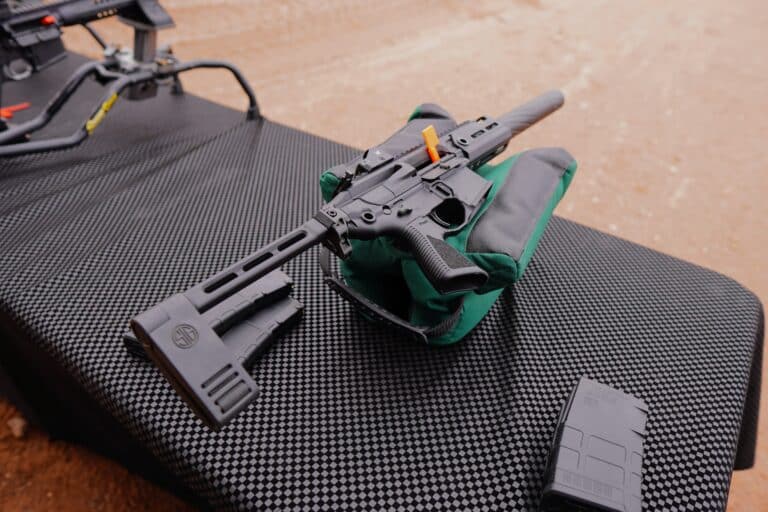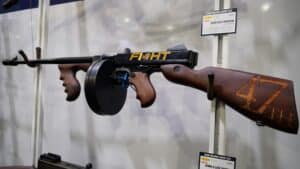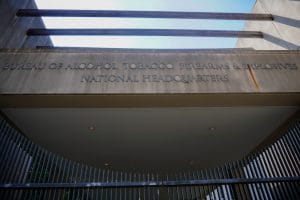The resolution to undo President Joe Biden’s pistol-brace ban won’t make it to his desk.
In a party-line vote, the Senate rejected the attempt to overturn the ATF’s reclassification of the devices on Thursday. The failure comes just a week after the same resolution passed the House of Representatives with minor crossover support from moderate Democrats. None of the Democratic senators or the independents who caucus with them voted for the repeal effort.
The final vote was 50 to 49, with Senator Chris Coons (D., Del.) not voting because his office said he was absent for “precautionary medical tests.”
The vote is a setback for gun-rights advocates. They had hoped to score a political win by getting the resolution through both houses of Congress and, in the process, bolster the legal cases already filed against the ban. The rejection marks one of the few times since 2022 Republicans have been unable to find enough Democratic support to get a Congressional Review Act resolution, which gives Congress the power to undo recent executive branch regulations and always get privileged up or down votes in the Senate, over the finish line.
The Democrats and Independents in the Senate who have opposed other gun restrictions or fought the President on the issue all voted to keep his brace ban. Senators Jon Tester (D., Mont.), Angus King (I., Maine), and Kyrsten Sinema (I., Ariz.) all voted against the resolution. None of them responded to a request for comment on their votes.
Senator Joe Manchin (D., W.Va.) said he supported the ban because it strikes an “important balance” between preventing mass shootings and not “infringing on the constitutional rights of law-abiding Americans.” He also argued it isn’t really a ban at all.
“Let me make this clear: this ATF Rule does not take away anyone’s Second Amendment rights and does not ban pistol braces in any form,” Manchin said in a statement. “Rather, the Rule clarifies that firearm manufacturers and dealers cannot circumvent life-saving protections that Congress implemented almost a century ago. This Rule does nothing to prevent any law-abiding gun owner from purchasing and keeping a pistol brace.”
The resolution’s defeat makes things easier on President Biden, who had promised to veto it.
“Even though Congressional Republicans should take additional action to keep these and other dangerous weapons off our streets, they are instead pushing a resolution to reverse this rule and the progress we have made to enforce existing statutory requirements on these dangerous weapons,” the White House said in a statement. “If H.J. Res. 44 were presented to the President, he would veto it.”
A veto would have been the likely end of the line for the resolution but would have pitted the President against some members of his own party. It won’t be necessary now, unlike with five previous resolutions.
The ATF announced the rule earlier this year. It reclassifies all guns with barrels less than 16 inches long and a pistol brace attached to them as short-barrel rifles or shotguns subject to National Firearms Act of 1934 (NFA) regulations. The reclassification affects millions of gun owners and could lead to federal felony charges for anyone caught with an unregistered braced gun.
It is President Biden’s most aggressive executive action on guns, which he has argued is justified by the appearance of braced guns in a handful of high-profile shootings.
“The rationale is clear: short-barreled rifles are more concealable than long guns, yet more dangerous and accurate at a distance than traditional pistols,” the White House said. “As a result of this industry innovation, in the past few years we have witnessed mass shooters – including those in Dayton, Ohio, and Boulder, Colorado – use these ‘brace’ devices on heavy pistols in order to inflict mass carnage.”
But gun-rights advocates have made eliminating the ban a top priority. They argue the braces are merely plastic pieces developed to help disabled shooters stabilize pistols, and the rule reclassifying them is beyond the authority of the ATF.
“Every day, millions of Americans — including many service-disabled veterans — rely on stabilizing braces to exercise their Second Amendment freedoms,” Representative Andrew Clyde (R., Ga.), who sponsored the House version of the resolution, told The Reload last week. “Yet through the ATF’s rule, the Biden Administration is attempting to circumvent Congress’ sole legislative authority by using executive fiat to turn these law-abiding gun owners into criminals for simply attaching this beneficial brace to their firearm.”
The ATF’s reclassification came after a decade where it told gun owners, with varying consistency, that putting braces on pistols did not mean they would become NFA items. That was because, unlike a stock, braces weren’t designed to be pressed against a shooter’s shoulder while firing. The agency’s flip-flop means anyone who bought a braced gun during that period would now have to register it with the ATF, dismantle it, or destroy it. Owners were given a four-month grace period by the agency where they could register their guns without having to pay the $200 NFA tax.
But that grace period, which ended in June, had little effect. As The Reload first reported, only a tiny fraction of the guns believed to be affected by the rule have been registered. According to the ATF, only about a quarter million registration applications were sent in before the grace period ended. That’s well short of the three to seven million braces the agency estimated are in circulation. It’s even smaller compared to the 10 to 40 million braces the Congressional Research Service has estimated are out there.
That puts the compliance rate between 0.6 percent and eight percent.
One factor driving mass non-compliance, and a bright spot for gun-rights activists still hoping to get the ban tossed, are the legal efforts to undo the brace ban. Multiple federal judges have already enjoined the ATF from enforcing the prohibition against millions of Americans who are members of different gun-rights groups. Just days before the end of the grace period, a Fifth Circuit Court of Appeals panel issued an injunction protecting Firearms Policy Coalition members and Maxim Defense customers from arrest or prosecution. That injunction led to several lower court judges in the circuit doing the same. Injunctions to block enforcement against Second Amendment Foundation and Gun Owners of America members followed the panel’s ruling.
The affected gun groups have seen new members pour in since the injunctions came down, with the Second Amendment Foundation claiming it added 20,00 in a week. More could soon be protected from prosecution under the rule, as the National Rifle Association recently filed to intervene in one of the Fifth Circuit cases that have received injunctions even as it awaits a ruling in the case it filed against the rule in the Eighth Circuit. A ruling on the merits of the case against the brace ban is also likely coming soon.
The Fifth Circuit panel is set to begin hearing oral arguments in the case against the ban on June 29th.
UPDATE 6-22-2023 2:49 PM EASTERN: This piece has been updated to include comment from Senator Manchin.







2 Responses
I think that these Red state senators will regret their choice. Manchin and Tester as Democrats prepare for what is expected to be a challenging election cycle in 2024, the party is looking to two of its lawmakers as crucial to maintaining its slim majority in the Senate: Joe Manchin of West Virginia and Jon Tester of Montana.
Yea, it seems like an odd choice for them to side with the President on a policy that effectively banned millions of guns. Senator Manchin can quible over terminology but the practical outcome of the policy is there are now millions of illegal unregistered SBRs where there used to be perfectly legal pistols. I don’t really understand the political calculation of breaking with President Biden on other CRA resolutions but not this one.